SecureVideo's integration with Microsoft Outlook Calendar allows you to automatically sync the SecureVideo sessions you host to your Outlook Calendar, and view your other calendared appointments within your SecureVideo calendar as well.
Once linked, any active sessions on your dashboard, as well any sessions that you create (and will host) in the future in SecureVideo will automatically populate within your Outlook Calendar. If you reschedule or cancel a session within SecureVideo, the corresponding session event in Outlook Calendar will also automatically update or be removed as well.
Please note that you should only edit SecureVideo sessions within the SecureVideo dashboard. Changes made to session events in Outlook Calendar will not be synced back to SecureVideo.
Enable Microsoft Outlook Calendar Sync (for the whole organization)
This requires the Account Administrator role.
1. Click on the profile icon and select "Account Options".
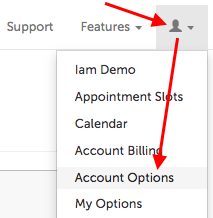
2. Click "Scheduling" to expand that section.
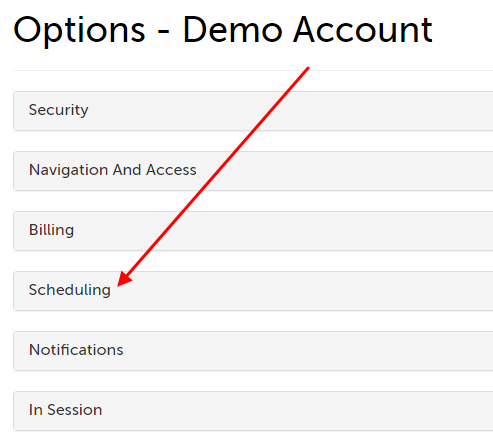
3. Scroll to the option "Enable Microsoft Calendar Integration" and set this to "Yes" or "No". The change will save automatically.
- If "Yes" is selected, then all licensed users in this organization will be able to link a Microsoft Outlook Calendar to their SecureVideo account from their profile page (see section, Link Your Microsoft Outlook Calendar).
- If "No" is selected, then licensed users in this organization will not see the option to link a Microsoft Outlook Calendar to their SecureVideo account from their profile page.
- "Can Users Override?"
- If this setting is set to "No", then non-Account Administrator users will not be able to enable this option for themselves.
- If this setting is set to "Yes", then any licensed user in this organization can enable this option for themselves; see section, Enable Microsoft Outlook Calendar Sync (for an individual user).

Enable Microsoft Outlook Calendar Sync (for an individual user)
Enable Microsoft Outlook Calendar Sync: For yourself
1. Click on the profile icon in the upper right hand corner and select "My Options".
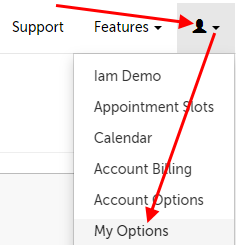
2. Click "Scheduling" to expand that section.
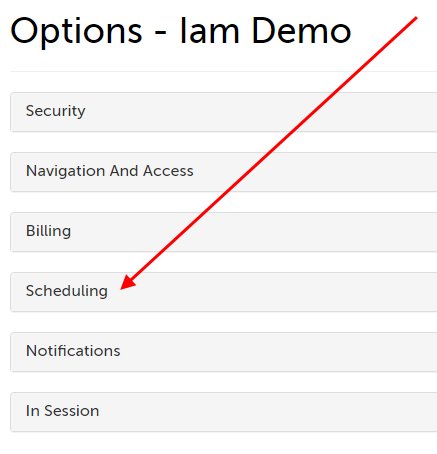
3. Scroll to the option "Enable Microsoft Calendar Integration" and set this to "Yes" or "No". The change will save automatically.
- If "Yes" is selected, then all licensed users in this organization will be able to link a Microsoft Outlook Calendar to their SecureVideo account from their profile page (see section, Link Your Microsoft Outlook Calendar).
- If "No" is selected, then licensed users in this organization will not see the option to link a Microsoft Outlook Calendar to their SecureVideo account from their profile page.

Enable Microsoft Outlook Calendar Sync: For another user in the organization
1. Click on the profile icon in the upper right hand corner and select "Account Users".
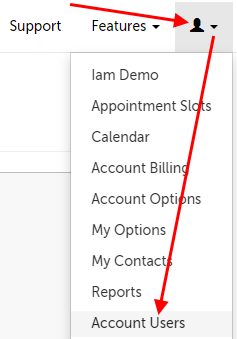
2. Click the "Options" button next to the licensed user you want to enable this setting for.
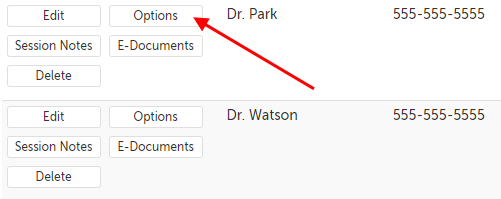
3. Click "Scheduling" to expand that section.
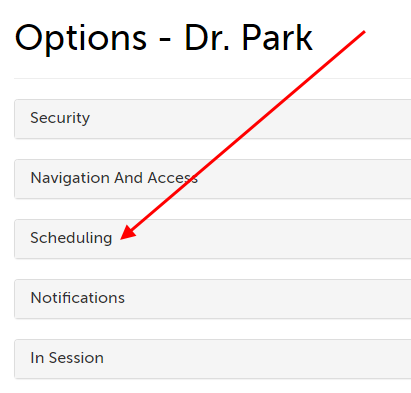
4. Scroll to the option "Enable Microsoft Calendar Integration" and set this to "Yes" or "No". The change will save automatically.
- If "Yes" is selected, then this user will be able to link a Microsoft Outlook Calendar to their SecureVideo account from their profile page (see section, Link Your Microsoft Outlook Calendar). Any sessions that is hosted by this user will be
- If "No" is selected, then licensed users in this organization will not see the option to link a Microsoft Outlook Calendar to their SecureVideo account from their profile page.

Link your Microsoft Outlook Calendar
You will need to be logged into your Microsoft account already or be ready to log into your Microsoft account, and this feature will have to have been enabled by an Account Administrator.
1. Click on the Profile icon in the upper right-hand corner, and select the first item from the dropdown menu (your current user name). In the example below, the current user's name is "Iam Demo".
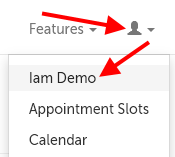
2. Scroll to the bottom of the page (below the Roles section) and click the "Link Microsoft Calendar" button.
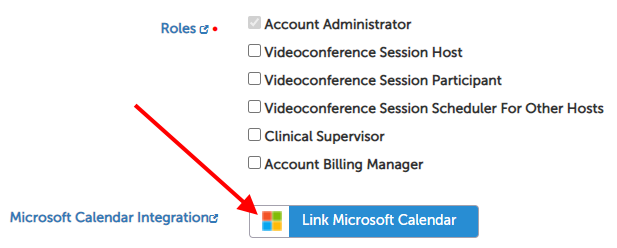
3. Sign into your Microsoft account or select an already logged in account that you want to link to your SecureVideo account.
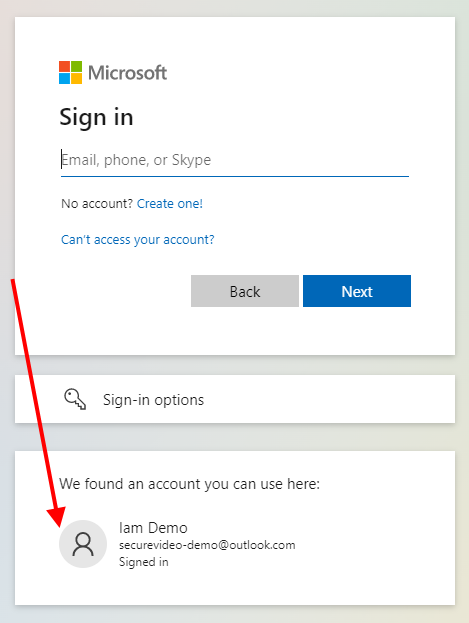
4. On the permissions request prompt, click "Yes" to grant the listed permissions.
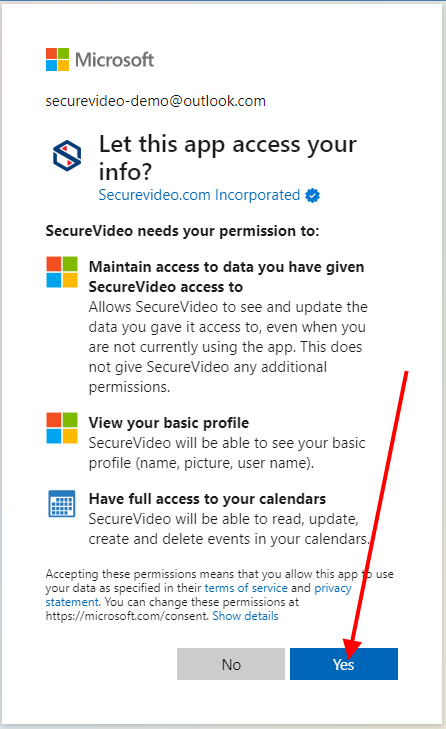
5. The Microsoft window will close, and on your profile page, you'll see an unlink button. This will confirm that the linking is complete. Any active sessions that you have in SecureVideo (that you are the host for) will be copied automatically to your Microsoft Outlook Calendar.
- Note: if you have sessions on your dashboard that you are NOT the host for, these will not be copied to your Microsoft Outlook Calendar.

View linked Microsoft Outlook Calendar events in your SecureVideo calendar
1. To navigate to your SecureVideo calendar, click on the profile icon and select "Calendar".
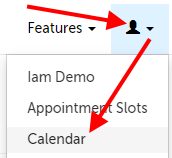
Or, if you are on your dashboard, click on the calendar icon near the upper right hand corner.
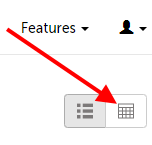
2. The events on your calendar will be different colors accordings to the type of event they are. You can reference the color legend at the top of the page.

- SecureVideo sessions will be shown in your branding's primary button color.
- Recurring sessions scheduled to be created will be shown in your branding's secondary button color.
- Events copied from your Microsoft Calendar will appear in dark gray.
If you click on a SecureVideo session event, it will take you to the dashboard and scroll down to that session.
If you click on a Microsoft Calendar event, it will take you to Microsoft's Outlook Calendar and open that event. Press the back button to return to SecureVideo.
Unlink your Microsoft Outlook Calendar
1. Click on the Profile icon in the upper right-hand corner, and select the first item from the dropdown menu (your current user name). In the example below, the current user's name is "Iam Demo".

2. Scroll down to the bottom of the page, and click the "Unlink" button. This will unlink your Outlook Calendar from SecureVideo. All SecureVideo session events that were created on the Outlook Calendar as a result of the link will be removed once the calendar has been unlinked.

This article was last reviewed by our Support team on May 15, 2022.